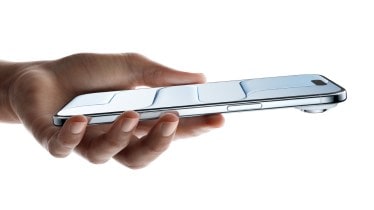The iPhone Air is slim. Incredibly slim. At 5.6mm, it is the thinnest iPhone that Apple has ever made. Hence, when showcased in a store, this can easily tempt buyers to let go of practicality and embrace a slim form factor. But what about real-world use cases? Will the slim iPhone Air be sturdy enough to survive the stress of the world? Will it not lead to another bendgate controversy?
Even though Apple confirms that the Air is made out of strong materials and engineered to withstand most stress with ease, some of Apple’s top executives decided to put on a live demonstration. In an interview with Tom’s Guide, Apple Marketing Chief Greg Joswiak and hardware engineering chief John Ternus did a bend test live on the camera. The results? Let’s find out.
iPhone Air bend test: What did Apple execs show
Both Apple execs talked a great deal about the iPhone Air’s design and resilience. Since these points were of prime concern almost a decade ago with the iPhone 6, these senior management people pushed the iPhone Air to its limits in front of the camera.
During the interview, Joswiak challenged the interviewer to try and bend the thin iPhone Air with all his might. Despite applying significant force, the interviewer was unable to break the phone, noting it only bowed slightly before returning to its original shape. Another presenter tried the same, and the iPhone Air didn’t bend. It always bowed slightly but returned to its original shape.
The bowing was attributed to a design choice that Apple made to distribute the forces equally across the body of the phone.
How did the iPhone Air not bend?
Apple attributes the phone’s strength to its grade 5 titanium frame, which, along with advancements in materials used elsewhere, allows the iPhone Air to hold on to its shape. Ternus explained that the new design was made possible by a stronger Ceramic Shield 2 on the back and the strength of the Titanium frame. It was revealed that the majority of the phone’s components are concentrated in the camera plateau within the device’s chassis, which allows the device to be light and thin without compromising on structural integrity.
The iPhone Air starts at Rs 1,19,900 in India for the base version with a 256GB variant. In pursuit of a slim profile, Apple had to let go of a physical SIM card slot and stick with eSIM only.
